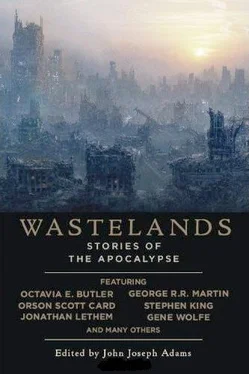The bearded man stood still, made no sound, refused to respond to clearly obscene gestures. The least impaired people tended to do this-stand back unless they were physically threatened and let those with less control scream and jump around. It was as though they felt it beneath them to be as touchy as the less comprehending. This was an attitude of superiority, and that was the way people like the bus driver perceived it. Such "superiority" was frequently punished by beatings, even by death. Rye had had close calls of her own. As a result, she never went unarmed. And in this world where the only likely common language was body language, being armed was often enough. She had rarely had to draw her gun or even display it.
The bearded man’s revolver was on constant display. Apparently that was enough for the bus driver. The driver spat in disgust, glared at the bearded man for a moment longer, then strode back to his gas-filled bus. He stared at it for a moment, clearly wanting to get in, but the gas was still too strong. Of the windows, only his tiny driver’s window actually opened. The front door was open, but the rear door would not stay open unless someone held it. Of course, the air conditioning had failed long ago. The bus would take some time to clear. It was the driver’s property, his livelihood. He had pasted old magazine pictures of items he would accept as fare on its sides. Then he would use what he collected to feed his family or to trade. If his bus did not run, he did not eat. On the other hand, if the inside of his bus was torn apart by senseless fighting, he would not eat very well either. He was apparently unable to perceive this. All he could see was that it would be some time before he could use his bus again. He shook his fist at the bearded man and shouted. There seemed to be words in his shout, but Rye could not understand them. She did not know whether this was his fault or hers. She had heard so little coherent human speech for the past three years, she was no longer certain how well she recognized it, no longer certain of the degree of her own impairment.
The bearded man sighed. He glanced toward his car, then beckoned to Rye. He was ready to leave, but he wanted something from her first. No. No, he wanted her to leave with him. Risk getting into his car when, in spite of his uniform, law and order were nothing-not even words any longer.
She shook her head in a universally understood negative, but the man continued to beckon.
She waved him away. He was doing what the less impaired rarely did drawing potentially negative attention to another of his kind. People from the bus had begun to look at her.
One of the men who had been fighting tapped another on the arm, then pointed from the bearded man to Rye, and finally held up the first two fingers of his right hand as though giving two-thirds of a Boy Scout salute. The gesture was very quick, it’s meaning obvious even at a distance. She had been grouped with the bearded man. Now what?
The man who had made the gesture started toward her.
She had no idea what he intended, but she stood her ground. The man was half a foot taller than she was and perhaps ten years younger. She did not imagine she could outrun him. Nor did she expect anyone to help her if she needed help. The people around her were all strangers.
She gestured once-a clear indication to the man to stop. She did not intend to repeat the gesture. Fortunately, the man obeyed. He gestured obscenely and several other men laughed. Loss of verbal language had spawned a whole new set of obscene gestures. The man, with stark simplicity, had accused her of sex with the bearded man and had suggested she accommodate the other men present-beginning with him.
Rye watched him wearily. People might very well stand by and watch if he tried to rape her. They would also stand and watch her shoot him. Would he push things that far?
He did not. After a series of obscene gestures that brought him no closer to her, he turned contemptuously and walked away.
And the bearded man still waited. He had removed his service revolver, holster and all. He beckoned again, both hands empty. No doubt his gun was in the car and within easy reach, but his taking it off impressed her. Maybe he was all right. Maybe he was just alone. She had been alone herself for three years. The illness had stripped her, killing her children one by one, killing her husband, her sister, her parents
The illness, if it was an illness, had cut even the living off from one another. As it swept over the country, people hardly had time to lay blame on the Soviets (though they were falling silent along with the rest of the world), on a new virus, a new pollutant, radiation, divine retribution The illness was stroke-swift in the way it cut people down and stroke like in some of its effects. But it was highly specific. Language was always lost or severely impaired. It was never regained. Often there was also paralysis, intellectual impairment, death.
Rye walked toward the bearded man, ignoring the whistling and applauding of two of the young men and their thumbs-up signs to the bearded man. If he had smiled at them or acknowledged them in any way, she would almost certainly have changed her mind. If she had let herself think of the possible deadly consequences of getting into a stranger’s car, she would have changed her mind. Instead, she thought of the man who lived across the street from her. He rarely washed since his bout with the illness. And he had gotten into the habit of urinating wherever he happened to be. He had two women already-one tending each of his large gardens. They put up with him in exchange for his protection. He had made it clear that he wanted Rye to become his third woman.
She got into the car and the bearded man shut the door. She watched as he walked around to the driver’s door-watched for his sake because his gun was on the seat beside her. And the bus driver and a pair of young men had come a few steps closer. They did nothing, though, until the bearded man was in the car. Then one of them threw a rock. Others followed his example, and as the car drove away, several rocks bounced off harmlessly.
When the bus was some distance behind them, Rye wiped sweat from her forehead and longed to relax. The bus would have taken her more than halfway to Pasadena. She would have had only ten miles to walk. She wondered how far she would have to walk now-and wondered if walking a long distance would be her only problem.
At Figuroa and Washington where the bus normally made a left turn, the bearded man stopped, looked at her, and indicated that she should choose a direction. When she directed him left and he actually turned left, she began to relax. If he was willing to go where she directed, perhaps he was safe.
As they passed blocks of burned, abandoned buildings, empty lots, and wrecked or stripped cars, he slipped a gold chain over his head and handed it to her. The pendant attached to it was a smooth, glassy, black rock. Obsidian. His name might be Rock or Peter or Black, but she decided to think of him as Obsidian. Even her sometimes useless memory would retain a name like Obsidian.
She handed him her own name symbol-a pin in the shape of a large golden stalk of wheat. She had bought it long before the illness and the silence began. Now she wore it, thinking it was as close as she was likely to come to Rye. People like Obsidian who had not known her before probably thought of her as Wheat. Not that it mattered. She would never hear her name spoken again.
Obsidian handed her pin back to her. He caught her hand as she reached for it and rubbed his thumb over her calluses.
He stopped at First Street and asked which way again. Then, after turning right as she had indicated, he parked near the Music Centre. There, he took a folded paper from the dashboard and unfolded it. Rye recognized it as a street map, though the writing on it meant nothing to her. He flattened the map, took her hand again, and put her index finger on one spot. He touched her, touched himself, pointed toward the floor. In effect, "We are here." She knew he wanted to know where she was going. She wanted to tell him, but she shook her head sadly. She had lost reading and writing. That was her most serious impairment and her most painful. She had taught history at UCLA. She had done freelance writing. Now she could not even read her own manuscripts. She had a houseful of books that she could neither read nor bring herself to use as fuel. And she had a memory that would not bring back to her much of what she had read before.
Читать дальше












